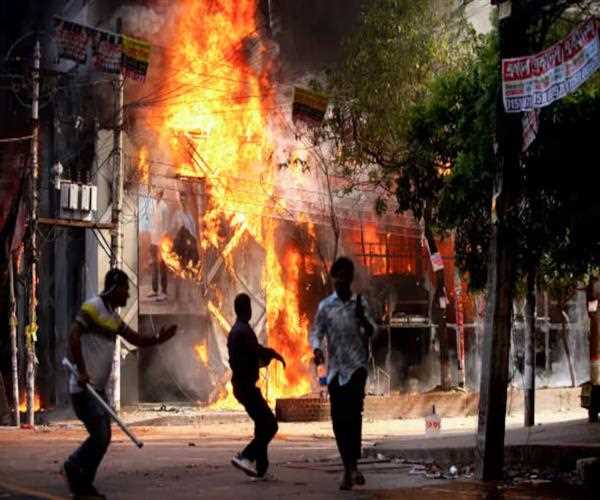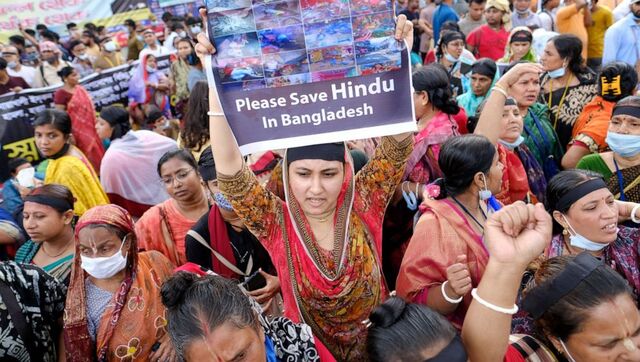
07-Aug-2024 , Updated on 8/12/2025 4:13:35 AM
Why Hindus are Under Attack in Islamic Country Bangladesh?
Bangladesh, a country brought into the world from the fierce segment of India and Pakistan in 1947 and later acquiring freedom from Pakistan in 1971, has a complex socio-political history. Despite the fact that it is a common state, unavoidably, the predominance of Islam and intermittent political insecurity have frequently prompted mutual pressures. A few Hindus were exposed to different occasions of brutality and estrangement.
Genuine preparation
Package heritage: In 1947, the Indian Cut made Pakistan, which included East Pakistan (presently Bangladesh). Because of incredible aggregate malevolent, the block was secluded, and numerous Hindus were ousted to India. Those left behind confronted a changed socio-political world in which Islam assumed a focal part in the personality of the country.
Battle of Autonomy in 1971: The battle for freedom from Pakistan in 1971 was extraordinary, and there was serious brutality for the Pakistani Armed Force. The Hindu people group, being seen as favorable to India, was focused on lopsidedly. This verifiable injury has wait-and-see impacts on Hindu-Muslim relations in Bangladesh.
Political Elements
Secularism versus Political Islam: Bangladesh's Constitution at first embraced secularism; however, political movements have seen an ascent in Islamist impact. Progressive government administrations have needed to adjust between mainstream standards and assuaging Islamist groups, frequently prompting strategies and activities that underestimate minorities, including Hindus.
Political Brutality and Fanaticism: Political viciousness is a common issue in Bangladesh. Islamist fanatic gatherings, like Jamaat-e-Islami, have intermittently designated Hindus to make common disagreement and attest their impact.
Social Elements
Segment Moves: The Hindu populace in Bangladesh has declined because of resettlement, transformation, and a low wealth rate. This segment shift has now and again powered the view of Hindus as an 'outcast' local area, regardless of their profound authentic roots in the district.
Strict Narrow mindedness: Cases of strict bigotry have been on the ascent, somewhat filled by revolutionary ministers and fanatic gatherings. Misleading publicity that depicts Hindus adversely adds to an environment of aggression, prompting assaults on sanctuaries, homes, and organizations.
Financial Inspirations
Land Grabs and Property Questions: Monetary motivators frequently support collective brutality. Hindus, who in some cases have important land and property, have been designated in arranged assaults to uproot them and hold onto their resources. The Vested Property Act, a regulation tracing all the way back to the 1960s, permitted the state to assume control over properties considered "foe" properties, excessively influencing Hindus.
Financial Minimization: Hindus in Bangladesh frequently face monetary underestimation, with restricted admittance to schooling and opportunities for business. This financial weakness makes them obvious objectives for abuse and savagery.
Global and provincial impact
International Strains: Bangladesh's relationship with India, an overwhelmingly Hindu nation, impacts inside elements. Enemies of India, who once in a while convert into antagonism against Bangladeshi Hindus, are seen as thoughtful to India.
Worldwide Islamist Developments: The ascent of worldwide Islamist developments has had an overflow impact in Bangladesh. Fanatic philosophies proliferated by bunches like ISIS and Al-Qaeda have discovered some footing, prompting assaults on minorities, including Hindus, as a component of a more extensive plan of laying out an Islamic state.
Lawful and Institutional Difficulties
Frail Policing: The powerlessness or reluctance of policing to safeguard minorities worsens what is happening. Culprits of brutality against Hindus frequently slip through the cracks, cultivating a culture of exemption.
Legal Shortcomings: The legal framework in Bangladesh is tormented by deferrals and defilement. Instances of savagery against Hindus seldom bring about opportune equity, deterring casualties from looking for legitimate responses.
Social media and Misleading Publicity
Falsehood Missions: Social media platforms are utilized to spread deception and fiery substance against
Hindus. Counterfeit news and doctored pictures can rapidly affect viciousness, as found in a few late occurrences where hordes went after Hindu areas in view of bits of hearsay spread on the web.
Local area reaction and flexibility
Hindu People Group Activism: In spite of the difficulties, the Hindu People Group in Bangladesh stays versatile. Local area pioneers and activists work indefatigably to safeguard their freedoms, advance interfaith discourse, and record cases of savagery to internationally bring issues to light.
Worldwide Backing: Worldwide common liberties associations and diaspora bunches assume a significant part in upholding the freedoms of Hindus in Bangladesh. Worldwide tension has at times prompted government activity to safeguard minorities, albeit much still needs to be finished.
)
Conclusion
The assaults on Hindus in Bangladesh are a multi-layered issue established in verifiable, political, social, and financial variables. Although the Government of Bangladesh has done whatever it takes to address these difficulties, it is normal that the endeavors they support will think twice about the interests and freedoms of the Hindu minority. Advancing mainstream administration, reinforcing legitimate requests, and advancing interfaith exchange are key stages towards building a more comprehensive and tranquil country. The worldwide climate and how to oversee Bangladesh have determined that it assumes a part in the crusades safeguarding minority opportunities.

Student
Content writing is the process of writing, editing, and publishing content in a digital format. That content can include blog posts, video or podcast scripts, ebooks or whitepapers, press releases, product category descriptions, landing page or social media copy and more.
Comments
Join Our Newsletter
Subscribe to our newsletter to receive emails about new views posts, releases and updates.
Copyright 2010 - 2026 MindStick Software Pvt. Ltd. All Rights Reserved Privacy Policy | Terms & Conditions | Cookie Policy